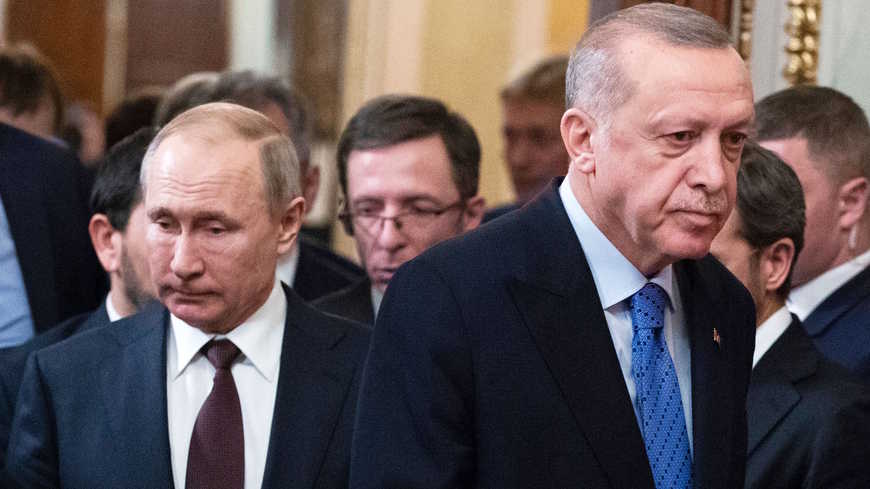Russian president Vladimir Putin has spoken of a historic rapprochement with Turkey, on the model of post-WW2 France and Germany.
But talk of a Turkish realignment from the West was premature, former Nato and Russian officials say.
“Today, they [France and Germany] are jointly performing their Nato defence and security duties the way they think fit,” Putin said on TV on 17 November.
“Why can’t we [Russia and Turkey] do the same here, in the Black Sea region?,” he added.
He spoke after letting Turkey join a new Russian military centre in Azerbaijan, imposing a peace deal on Armenia.
Russia had a “positive experience” of joint operations with Turkey in the Syria war, Putin added.
Turkish president Recep Tayyip Erdoğan bought and recently test-fired a Russian air-defence system, the S-400, despite threats of US sanctions if he did so.
And his navy has bullied French and Greek warships, prompting a European outcry.
But for all that, the view from Brussels was that Turkey was “not about to sacrifice Nato and its anchorage in the West to go off in a new direction with Russia”.
“I don’t buy this theory that Turkey is realigning in the way Egypt did, when it broke its alliance with the Soviet Union in the 1970s to move into the American camp, but Turkey would be going in the other direction”, Jamie Shea, a former Nato official in charge of emerging security challenges, told EUobserver.
Putin was “too intelligent” to think he could “persuade Erdoğan into a new alignment,” Shea said.
And Turkey was too big a Western asset in the Middle East for Nato to let fail, he added.
US sanctions could still be avoided at the “eleventh hour”, Shea, who now works for British-based think tank Chatham House, said.
Erdoğan bought the Russian S-400 in protest that the US would not sell him state-of-the-art ‘Patriot’ air-defence technology, Shea said.
But the incoming US administration of Joe Biden could do a Patriot deal and the S400-s could end up being “mothballed” or “sold off”, Shea suggested, the way France, a few years ago, sold ‘Mistral’ warships to Egypt, when its arms deal with Russia went sour.
“Nato is used to long-term management of allies who might be difficult,” Shea continued.
And Putin’s deals with Erdoğan had come at a price, he noted.
“There’s a greater Turkish role in its old Ottoman sphere of influence, which Putin would have considered to be a Russian sphere for the past 20 years,” Shea said.
‘No alliance’
The outlook on Turkish realignment was broadly similar for Dmitri Trenin, the director of the Carnegie Moscow Centre think tank in Russia.
“There is no alliance between Russia and Turkey,” Trenin told EUobserver.
And Putin’s ambition for ties with Erdoğan was limited to regional “Realpolitik”, Trenin indicated.
“Putin is keen on preserving a peaceful relationship with Turkey, a rising regional power, cooperating where interests are sufficiently close, and managing differences, preventing them from degenerating into conflicts,” Trenin, who is a former Russian military-intelligence colonel, said.
Looking at the recent Russia-Turkey deal in the South Caucasus, he said: “Cooperation on Nagorno-Karabakh [a region at the heart of the conflict] creates a better climate for interaction across the board. Lack of cooperation there would have soured relations across the board”.
“But each situation is dealt with on its own merits,” Trenin added.
Russian and Turkish “interests may diverge and even clash” in other conflicts, such as those in Libya and Syria, he also said.
Trenin gave a different assessment of who might be better at handling complicated friends, such as Turkey, than the ex-Nato Shea.
“Russians can deal with anyone on the basis of Realpolitik,” Trenin said.
But “Nato is not well designed to deal with a country that seriously pursues what is known in the post-Soviet world as a multi-vector foreign and security policy,” he added.
Handshakes
The outlook was also similar from Istanbul for Asli Aydıntaşbaş, from the European Council of Foreign Relations (ECFR) think tank.
Doing conflict deals with handshakes appeared to make Putin and Erdoğan feel good in “a way that you could never sit down and do with a European leader,” Aydıntaşbaş said.
But their relationship was merely “transactional,” she added.
And, meanwhile, if Turkey was too big for Nato to let go, then Western money was too big for Erdoğan to lose.
The West needed Turkish radar bases and Turkish intelligence on Middle East jihadists, but Erdoğan needed Western investment, or more, to finance his debt.
“Will we go back to the days of IMF [International Monetary Fund] bailouts? A lot of Erdoğan’s success has previously been due to the performance of Turkey’s economy,” Shea, the ex-Nato official, noted.
“Russia has oil and natural gas, so it’s able to sustain a system of personal government that’s not rules-based,” the ECFR’s Aydıntaşbaş said.
“Turkey is a country that’s integrated into the world economy, the European economy, and, more than anything, it needs foreign investment,” she added.
“While you may want to run your country like Putin, you might not be able to in the absence of oil and gas,” Aydıntaşbaş said.
And Putin was not a feasible sponsor for Erdoğan, she added.
“Russia is a middle-sized economy, despite its military power. It has nowhere near one of the top economies in the world, and Turkey’s economic needs are vast,” Aydıntaşbaş said.
By ANDREW RETTMAN
Source: EU Observer



